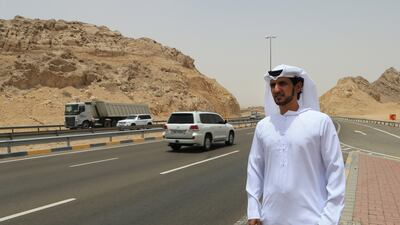ABU DHABI // Road-safety experts and frequent travellers to Salalah are advising people to fly, not drive, to the southern Omani city.
Their warnings follow Friday's three-vehicle crash in which five Emiratis from the same family died on the road to the resort.
The accident is the latest in a series of collisions on the road to Salalah that have claimed Emirati lives in the past few years.
“I always encourage people to fly to Salalah if they have a chance,” said Munira Al Balushi, who is head of the Omani road-safety campaign “Tell a Friend”.
Speaking at the Salalah Tourism Festival where the five-year campaign – now in its third year – is raising road-safety awareness among the public, Ms Al Balushi said long trips could be a significant factor in the Emirati fatalities.
“We travel long distances in Oman and for Emiratis driving down, fatigue is a major issue,” she said.
Having travelled to Salalah every summer for the past 10 years from his home in Al Ain, Ahmed Al Sheryani said that the dangerous roads had convinced him to fly for the past three years.
“I’ve seen too many accidents on that road to continue driving,” said Mr Al Sheryani, an Emirati who returned from his latest journey to southern Oman only last week.
Mr Al Sheryani said the unfamiliarity of the road, speed bumps, detours and a lack of barriers along some stretches led to accidents.
“You’re so isolated it could take hours for an ambulance to reach you,” he said.
He said those who did not want to part with their cars should have them shipped while they safely flew.
Last Friday’s accident killed Emiratis Salama Al Menhali, 9, Fatima bin Madi, 20, Wafa Al Menhali, 48, Ali bin Madi and Ahmad Al Menhali, 60.
Mr Al Menhali’s wife, Hamida Al Makhashen, 52, was the only survivor in the family Lexus. She suffered a broken arm.
The Lexus changed lanes into the path of a lorry and also hit a pick-up truck, police said.
Robert Hodges, chief operating officer at Emirates Driving Institute, said people should not make the road journey unless they had to, but there were ways of minimising the risk.
“No doubt driving to Salalah is more hazardous than here, as UAE drivers are used to world-class roads and don’t have to deal with potholes, broken margins, protruding drain covers and bumpy roads,” Mr Hodges said.
He said that before a long car journey, drivers should have a tune-up, make sure the tyre pressure was correct and ensure there was enough fuel.
They should also plan the trip in advance, have no more passengers than there are seat belts available, and have child seats for every youngster in the car.
But Mr Hodges said the most important aspect was keeping enough space between you and the car in front.
“You’re essentially driving blind when you’re right behind the car ahead of you,” he said.
The founder of Road Safety UAE, Thomas Edelmann, agreed that the unfamiliarity of the roads contributed to the accidents involving Emiratis.
“We are blessed in the UAE with fantastic highways and little elevation, but drivers have to pay more attention and they get exhausted on roads they don’t know,” Mr Edelmann said.
He said the driver and all passengers should get out of the vehicle every three hours to refresh themselves.
But Hessa Abdullah, 26, said that apart from the occasional filling station, there were little options for rest on that road.
“It’s not safe and my family and I will not be driving down there again,” said the Emirati, who makes frequent trips to Salalah with her family.
Ms Abdullah said she was fortunate in past trips to be driven by her late father who, having worked for Sharjah Police, was a cautious motorist.
“He was very careful but you never know what can come up,” she said.
Oman has the highest death rate from road incidents in the GCC, says a World Health Organisation report that shows 30.4 deaths for every 100,000 people in the sultanate in 2010.
The UAE registered the second-lowest rate, with 12.7 deaths for each 100,000, in the WHO’s Global Road Safety Report 2013.
Bahrain recorded the region’s lowest, with 10.5 deaths for each 100,000, while Saudi Arabia, Kuwait and Qatar came in at 24.8, 16.5 and 14 respectively.
tsubaihi@thenational.ae

